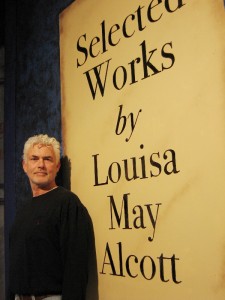The American classic, Little Women, will be performed in the Orcas Center Black Box with an Orcas cast directed by Robert Hall, beginning this Thursday, Oct. 28.
Hall came to Orcas as an ideal spot to move his sailboat, and soon became involved in the theater scene here. He offered to volunteer his lighting talents in the 2008 production of The Fantasticks, but was told by Director Jean Henigson that he could only do the lighting if he played the part of narrator-puppetmaster El Gallo.
This year he was approached to direct a play, and submitted a number of script suggestions to Orcas Center Executive Director Barbara Courtney. She asked Hall if he’d be willing to direct Little Women, saying, “We liked the idea of Little Women because it has been such an important piece of literature in the lives of so many of us, and because it offered the opportunity to cast both young and adult actors.”
The cast includes:
Brigid Ehrmantraut as the young Meg; Cara Russell as Meg the woman;
Claire Orser as young Jo; Maria Massey as the grown-up Jo;
Aliza Diepenbrock as young Beth; Clarabeth Smith as the older Beth;
Claire Bishop Martin as young Amy; and Jamie Mulligan-Smith as the young woman;
Other roles are filled by Mimi Anderson as the beloved mother, “Marmie,” Matthew Laslo-White as the young neighbor-next-door, (Laurie) and Zak Knight at the grown-up Laurie, Ray Doss as the young Mr. Brooks, and Jared Grantham as the adult. Deborah Sparks plays the awesome “Aunt Jo March,” Frank Michels plays the soldier-father, and Indy Zoeller performs as Professor Bauer. Donna Laslo narrates the production, in a part written by dramaturge Michele Griskey-Watson. Beth Baker is stage manager and Marcia Gillingham is wardrobe mistress for the production, aided by Diane Skaar and Baker. The set was constructed by Chris Brehms and Sparks, with assistance from Phil Burbo. Sascha Hagen and Matthew Laslo-White will play period violin music between the three acts.
Hall says “A lot of people have been working on this for one goal — becoming an ensemble. There’s noting better than when that community experience happens.”
Hall has experience acting and directing at the University of Montana and the American Conservatory Theater in San Francisco, with roles in the movies, “The Horse Whisperer” and “A River Runs Through It” among his credentials. He describes Orcas Island as “almost a sanctuary” and says he’s “still in the discovery mode” of appreciating life on the island.
“Being a part of the theater is a great part of”Theater has been my family; I gravitate toward creative people.” Little Women is his first directing assignment here on Orcas. He says, like many, he was inclined to dismiss the story as “fluff,” but he’s learned that Louisa May Alcott informed the juvenile novel with “a whole wide scope of her life that nobody knows about.” That scope includes literary mentorship by Ralph Waldo Emerson and nature lessons at the side of Henry David Thoreau, (both of whom she developed crushes on).
Hall says, in today’s vernacular, “you’ve got to have a fairly dynamic mind and fertile personality to hang with those boys.”
The Black Box production, adapted by John D. Ravold with further additions by Michele Griskey-Watson, “gives the audience a peek at the heart of the book, a look into who this woman was,” says Hall. The characters emerge from the book to portray the coming-of-age theme of the March family during the American Civil War. The production shows the timelessness of family love as the four sisters grow up together.
As Diane Reisen, author of the Public Broadcasting System (PBS) Louisa May Alcott: the Woman Behind Little Women, said, “Little Women has the element of a quest, but with lots of romance, clothes, relationships, and the ambiguity of womanhood, where maturity is not independence but a delicately-balanced interdependence. Little Women nourishes moral clear-sightedness and courage for the quest in its readers. As one Korean reader said, “you don’t grow up to walk two steps behind your husband when you’ve met Jo March.”
Hall is pleased that his vision of “paying homage to the book” with an emphasis on the characters therein has been accomplished. He admits to pushing the cast a little bit, “I wanted people to reach out a little and grow. You carve and mold and then you back and blow and the embers and hopefully, you get a fire.”
Beyond the art of directing and performing, Hall says, “It’s really about people having fun and learning in a community atmosphere.The kids, all the actors, are so involved. When everybody gets behind a good thing like community theater — there’s nothing better.”
Hall anticipates the audience’s enjoyment of the production, saying, “Once we luanch, we’re off into our own adventure. It’s the magic of the theater!”
Little Women
Originally written on commission — in 10 weeks! — as a commercially-popular juvenile novel, Little Women was a huge success for Louisa May Alcott, whose voluminous writing was matched only by her vow to redeem her family from spirit-crushing poverty.
Like her character, “Jo” in Little Women, Louisa grew up a tomboy, whose active spirit and rich imagination carried over into her writing. Often her stories became melodramas that she and her sisters would act out for friends. Louisa preferred to play the “lurid” parts in these plays –“the villains, ghosts, bandits, and disdainful queens.”
Her father, Bronson Alcott, was a noted educator and philosopher; less acknowledged were his shortcomings as family bread-winner. And, through her father’s friendships, the young Louisa enjoyed the company of poets, writers and philosophers Ralph Waldo Emerson, Henry David Thoreau, and Nathaniel Hawthorne.
At age 15, troubled by the poverty that plagued her family, she vowed: “I will do something by and by. Don’t care what, teach, sew, act, write, anything to help the family; and I’ll be rich and famous and happy before I die, see if I won’t!”
And so she worked as a seamstress, household servant, governess and teacher , meanwhile writing all the time.The family got by on credit, loans and gifts from relatives, and the generosity of friends. People left food baskets on the doorstep, and donated worn hand-me-down clothing. Emerson tucked $20 bills under candlesticks, paid their rent, and put up half the money for the two houses they owned in Concord at different times.
Louisa May Alcott’s career as an author began with poetry and short stories that appeared in popular magazines. In 1854, when she was 22, her first book Flower Fables was published. A milestone along her literary path was Hospital Sketches (1863), based on the letters she had written home from her post as a nurse in Washington, DC during the Civil War.
When Louisa was 35 years old, her publisher in Boston, Thomas Niles, asked her to write “a book for girls.” And so, Little Women was written at her home near Boston from May to July 1868.
And the rest is history, for the last 150 years.
Little Women can be seen at the Orcas Center’s Black Box theater on Oct. 28 and 29 at 7:30 p.m., and Saturday, Oct. 30 at 2 p.m. It will be performed the following weekend, from Thursday, Nov. 4 through Saturday Nov. 6 at 7:30 p.m. Tickets are $13 and $9. For more information, call Orcas Center at 376-2281, or go to www.orcascenter.org.
**If you are reading theOrcasonian for free, thank your fellow islanders. If you would like to support theOrcasonian CLICK HERE to set your modestly-priced, voluntary subscription. Otherwise, no worries; we’re happy to share with you.**









Great cast in an excellent production=what a night!